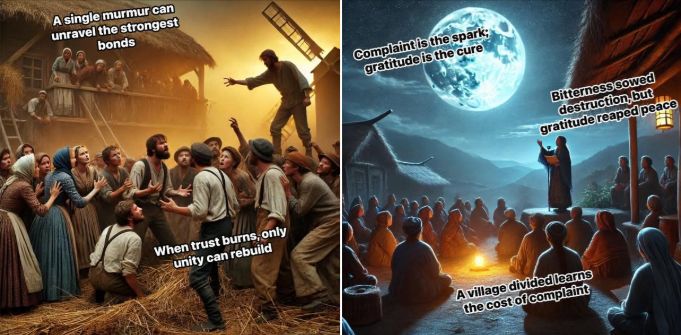
Once, in the heart of a vast and thriving kingdom, there was a small village known for its peace and harmony. The villagers lived simple, contented lives, sharing resources and celebrating each other’s joys. Their unity was their strength, and their hearts were light as they worked the fields and tended to their families.
One fateful day, however, a single murmur disrupted the balance. A farmer named Aran, exhausted by the unyielding sun and the weight of his tasks, grumbled aloud, “Why is my land the driest? Why must I labor so hard while others have it easier?”
His words, carried on the wind, reached another farmer, Dalen, who began to question his own lot. “It’s true,” Dalen thought. “My crops are harder to tend than my neighbor’s. Why does he prosper while I struggle?”
Soon, the complaints spread like wildfire. Each villager began to compare their lives to others, focusing not on what they had but on what they lacked. Grievances grew.
Complaint is the origin of every evil. As the villagers’ complaints deepened, they began to harbor resentment. Resentment turned to hate, and hate turned to enmity. Neighbors who once shared meals and stories now avoided each other, their hearts hardened by bitterness.
The division reached its peak during the annual harvest festival. What had once been a joyous occasion turned into a battleground of accusations. One villager, blinded by jealousy, sabotaged another’s grain store. Another sought revenge by setting fire to a rival’s field. The once-thriving village was now a land of scorched earth and shattered trust.
Enmity leads to violence.
The village elder, a wise woman named Liora, called for an urgent gathering. She spoke with a voice both stern and sorrowful:
“Do you see what has become of us? Our discontent has poisoned our hearts and our home. We forgot the blessings we shared and let complaint sow hatred among us.”
Her words struck a chord, and the villagers began to weep for what they had lost. Slowly, they began to rebuild—not just their homes and fields, but their bonds of trust and gratitude.
The village learned a hard lesson: complaints, when nurtured, grow into forces of destruction. But gratitude, when cultivated, becomes the root of peace.
And so, they vowed to remember: complaint may lead to hate, enmity, and violence, but the antidote lies in unity and contentment. From that day forward, the village flourished once more, bound by a shared understanding of the dangers of unchecked discontent.

